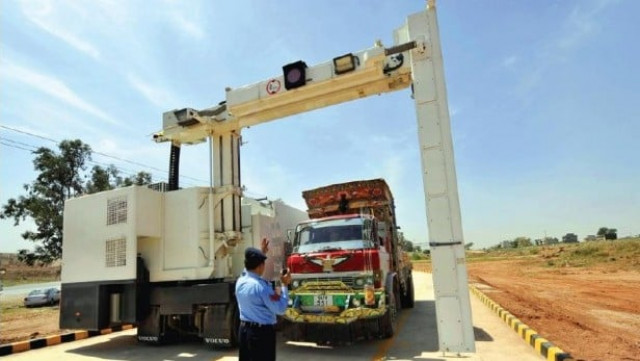Newly-installed security scanners arouse curiosity

This is the first time Pakistani authorities have used the Chinese-built devices to protect a city since Taliban and Al-Qaeda-linked groups went on a bombing campaign, killing more than 3,200 people in nearly three years.
Looking for a bomb in a country with a population of 167 million and an under-equipped police force can be like looking for a needle in a haystack. Checkpoints have mushroomed over the last year in the capital, where a suicide truck bomb demolished part of the five-star Marriott Hotel in September 2008 killing 60 people, and there are frequent alerts about possible attacks.
Police say 1,000 officers are manning more than 90 checkpoints at entry points, along main roads, outside sensitive targets and in residential areas. But now they hail huge scanners bought from China for nearly $ 3 million on a soft loan —’ a further sign of growing economic and security cooperation with Beijing.
The scanners resemble giant airport security arches, mounted on wheels so they can pass back and forth over stationary vehicles. On a dusty road outside the capital, the pale grey arch of one scanner, standing more than 4.5 metres (15 feet) high, checked a brightly painted truck. Inside the control booth, Muhammad Afzal, the officer in charge, kept a close eye on a bank of computers analysing the image. “The scanners have a 100-percent accuracy rate,” he told us. “We detected 20,000 bullets in a private vehicle yesterday,” he added.
It turned out the ammunition belonged to the paramilitary and was being legally transported. Trucks coming off the motorway from Peshawar, capital of the northwest and gateway to the lawless tribal belt seen as the fountain of Taliban and Al- Qaeda militancy in Pakistan, can now pass through the scanner.
Vehicles are also scanned as they come from Punjab, Pakistan’s most populous province, where the southern rural belt has been increasingly linked to militant attacks and which is seen as a recruiting ground for the Taliban. Current capacity is 30 to 35 trucks per day per scanner —’ a drop in the ocean of 250,000 cars and 3,000 trucks that stream into Islamabad each day, according to traffic police.
Only large trucks picked out by monitoring police officers are checked by the devices. Even so, tempers are fraying among truckers, who consider the whole thing a waste of time and money which causes tailbacks on the approach from Peshawar. “It may be beneficial for some people but it’s nothing but a waste of time for us. We have to wait for hours in long queues to pass through the scanning process,” said truck driver Fazal Karim. Karim, who supplies bricks to construction companies in Islamabad, claimed he was losing at least Rs1,500 ($15) per day.
Farkhand Iqbal, project director of the National Police Bureau, told AFP that Pakistan acquired the scanners for $2.96 million on a soft loan payable over 25 years. At the moment, Pakistani officials acknowledge they still need more time before they are able to operate the machines with ease and confidence. Chinese experts are due in the capital to give more training to a team of at least 10 Pakistani scanner operators.
China says it wants to boost trade with Pakistan in coming years. “We are helping Pakistan overcome its security problems. We will assist them in anything they want to do to improve security and bring peace in the country,” Yao Jing, a spokesman for the Chinese embassy in Pakistan said. “The volume of trade between China and Pakistan at the moment is $6.8 billion and China wishes to enhance it much. We expect to enhance our mutual trade more than $10 billion in next few years,” Yao added.



















COMMENTS
Comments are moderated and generally will be posted if they are on-topic and not abusive.
For more information, please see our Comments FAQ